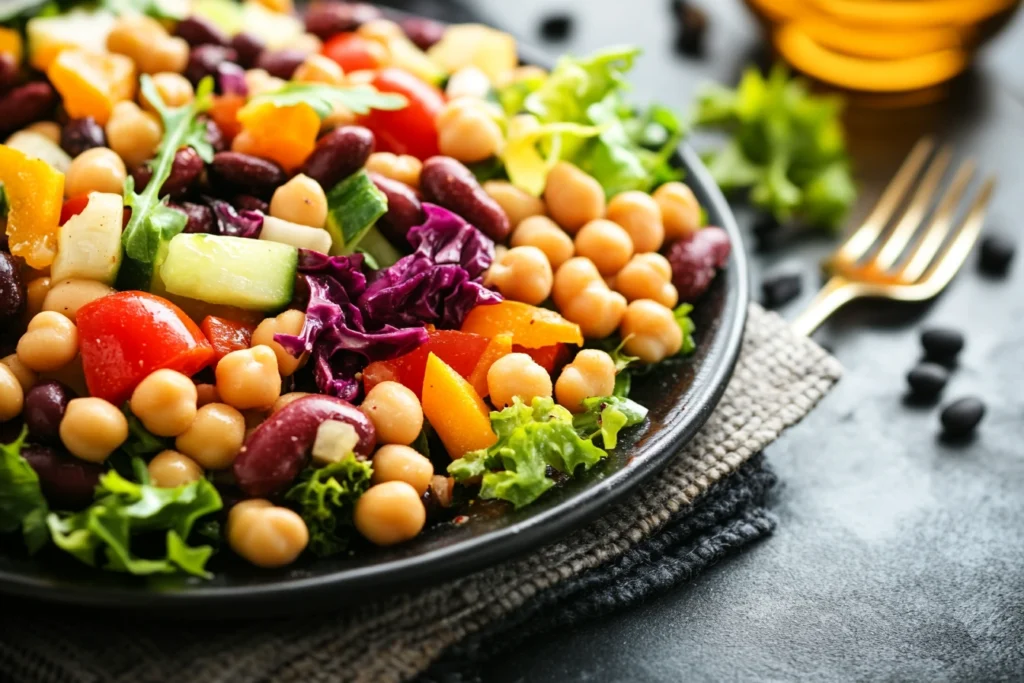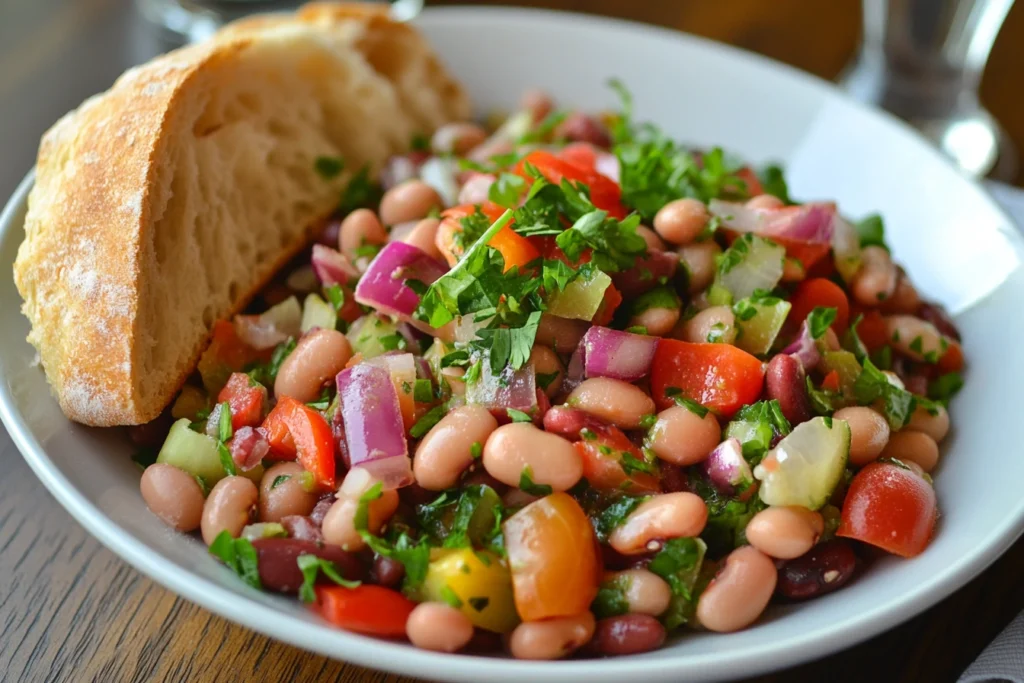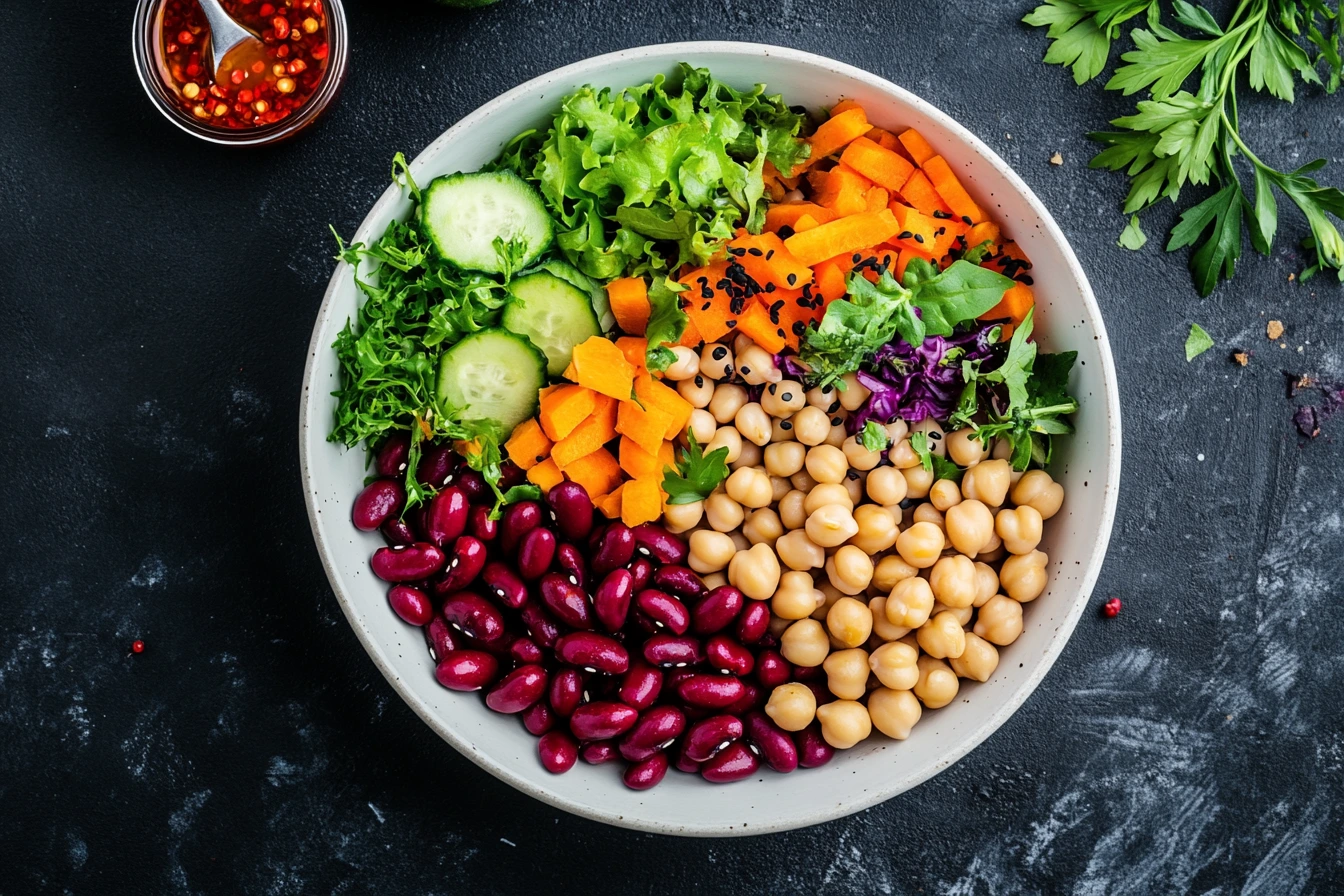Introduction
The Popularity of Bean Salads
Dense bean salads are popular for their versatility, nutrition, and easy preparation. They often include beans like black beans, kidney beans, chickpeas, or cannellini beans mixed with fresh vegetables, herbs, and dressings. The benefits of dense bean salads are undeniable, as they fit many diets such as vegan, vegetarian, high-protein, or low-carb. These salads work well as a side dish or a main course, appealing to a variety of tastes.
The Unique Appeal of Dense Bean Salads
Dense bean salads bring a fresh twist to traditional salads. They focus on rich textures and bold flavors. These salads have a high ratio of beans and hearty ingredients like roasted vegetables, grains, or nuts. They are both filling and flavorful. Dense bean salads suit those who want a meal packed with nutrients and lasting energy. Their solid build makes them great for meal prep, picnics, or a satisfying dinner centerpiece.
Ditch Dinner Stress — Cook Smart, Not Hard 🍽️
35 quick & budget-friendly 5-ingredient dinners to save your evenings. Simple. Delicious. Ready in 30 minutes or less.
Health Benefits of Dense Bean Salad

High in Protein
Dense bean salads are an excellent source of plant-based protein. Beans like chickpeas, black beans, and lentils provide the essential amino acids your body needs. This makes them a perfect choice for vegetarians, vegans, and anyone seeking protein-rich meals. Protein helps build and repair muscles, supports healthy skin, and keeps you feeling full longer.
Rich in Fiber
Beans are naturally high in dietary fiber, making dense bean salads a great way to support digestion. Fiber helps regulate blood sugar levels, lowers cholesterol, and promotes a healthy gut. Including fiber-rich foods like beans in your diet can also aid in weight management by keeping you satisfied after meals.
Packed with Essential Vitamins and Minerals
Dense bean salads are loaded with important vitamins and minerals. They often include ingredients rich in iron, magnesium, potassium, and folate. These nutrients support energy production, bone health, and immune function. Adding vegetables, nuts, and seeds to the salad further boosts its nutritional value, offering a well-rounded, nutrient-dense meal option.
Nutritional Advantages
Low in Calories, High in Nutrients
Dense bean salads provide a nutrient-dense option that is low in calories yet rich in essential nutrients. Beans are packed with protein, fiber, and complex carbohydrates, offering sustained energy without excessive caloric intake. Adding fresh vegetables, herbs, and light dressings enhances the flavor while keeping the calorie count in check, making it a healthy and satisfying meal.
Helps in Maintaining Healthy Blood Sugar Levels
The complex carbohydrates and high fiber content in beans help regulate blood sugar levels. Unlike simple carbs, the slow digestion of beans prevents sudden spikes and crashes in blood sugar. This makes dense bean salads an excellent choice for individuals managing diabetes or looking to maintain stable energy throughout the day.
Supports Digestive Health
Dense bean salads are rich in dietary fiber, which promotes healthy digestion. Fiber adds bulk to the stool, preventing constipation and supporting regular bowel movements. The prebiotic properties of beans also nourish beneficial gut bacteria, improving overall gut health and enhancing nutrient absorption.
Why It’s Perfect for Any Diet
Vegan and Vegetarian-Friendly
Dense bean salads are naturally vegan and vegetarian, relying on plant-based ingredients like beans, vegetables, and herbs. They provide essential nutrients, such as protein and iron, often lacking in plant-based diets. With the right combination of ingredients, these salads can easily meet the dietary needs of vegans and vegetarians while offering a satisfying and flavorful meal.
Customizable for Keto, Paleo, or Gluten-Free Diets
Dense bean salads are highly adaptable, making them suitable for various dietary preferences. For keto followers, reducing the amount of beans and adding low-carb vegetables, healthy fats like avocado, and protein sources like tofu or eggs can make them keto-compliant. Paleo enthusiasts can include beans sparingly or replace them with paleo-friendly legumes, nuts, or seeds. For those avoiding gluten, these salads are naturally gluten-free as long as dressings and toppings are carefully selected. This flexibility makes dense bean salads a versatile option for anyone.
Convenience and Versatility
Easy to Prepare
Dense bean salads are incredibly simple to make, requiring minimal cooking and preparation. Most recipes involve rinsing and mixing canned or cooked beans with fresh vegetables, herbs, and a quick homemade dressing. This ease of preparation makes them a go-to option for busy individuals who want a nutritious meal without spending hours in the kitchen.
Suitable for Meal Prep
Dense bean salads are perfect for meal prep because they stay fresh for several days when stored in the refrigerator. Unlike leafy greens, beans and other hearty ingredients don’t wilt or lose their texture over time. Preparing a large batch at the start of the week provides a quick, healthy option for lunches, dinners, or snacks.
A Crowd-Pleaser for Potlucks and Parties
Dense bean salads are a hit at potlucks and parties due to their versatility and universal appeal. They cater to various dietary preferences and restrictions, making them a safe choice for gatherings. Their vibrant colors and bold flavors also make them visually appealing and delicious, ensuring they stand out on any buffet table.
How It Fits Into a Balanced Diet
As a Main Course
Dense bean salads are hearty enough to serve as a main course. Packed with protein, fiber, and healthy fats, they provide sustained energy and keep you feeling full. Adding ingredients like avocado, nuts, or seeds can enhance the richness, while herbs and spices elevate the flavor. This makes it a complete and satisfying meal for lunch or dinner.
As a Side Dish
Dense bean salads also work well as a side dish, complementing a variety of main courses. They pair perfectly with grilled meats, roasted vegetables, or seafood, adding a flavorful and nutritious element to your meal. Their robust texture and tangy dressings balance the flavors of heavier or more subtly seasoned dishes.
Paired with Other Dishes for Complete Nutrition
For a well-rounded, nutritionally balanced meal, dense bean salads can be paired with other dishes. Adding a serving of whole grains like quinoa or brown rice boosts the fiber and carbohydrate content. Incorporating dairy or plant-based alternatives provides additional calcium and vitamins. This flexibility ensures that dense bean salads fit seamlessly into any diet plan while delivering complete nutrition.
Environmental Benefits
Beans as a Sustainable Protein Source
Beans are one of the most environmentally friendly protein sources available. Compared to meat production, growing beans requires significantly less water, land, and energy. They also produce fewer greenhouse gas emissions. By incorporating beans into your diet through dense bean salads, you support a more sustainable food system and help reduce your carbon footprint.
Reducing Food Waste with Leftover-Friendly Recipes
Dense bean salads are excellent for reducing food waste, as they are versatile and leftover-friendly. They can be made using ingredients already in your pantry or refrigerator, like canned beans, vegetables nearing their peak, or leftover grains. These salads store well and often taste better the next day as the flavors meld, making them a practical way to use up excess ingredients while minimizing waste.
Cost-Effective Nutrition
Affordable Ingredients
Dense bean salads are made from budget-friendly ingredients like beans, lentils, and seasonal vegetables. Beans, whether canned or dried, are an inexpensive source of protein and fiber. Fresh or frozen vegetables, herbs, and simple pantry staples like olive oil and vinegar complete the dish without stretching your budget. This affordability makes dense bean salads a great option for anyone looking to eat healthy on a budget.
Bulk Cooking Benefits
Preparing dense bean salads in bulk is not only time-efficient but also cost-effective. Large batches can be stored and used for multiple meals throughout the week, reducing the need for frequent grocery trips. Buying beans, grains, and other ingredients in bulk further lowers costs, making it easy to enjoy nutritious meals while saving money. This approach ensures you get the most value from your ingredients while maintaining a balanced diet.
Delicious and Flavorful

Customizable Flavor Profiles
Dense bean salads offer endless opportunities to tailor the flavor to your preferences. You can experiment with different herbs, spices, and dressings to create unique taste profiles. Whether you prefer a Mediterranean twist with olive oil, lemon, and oregano or a Southwest flair with lime, cilantro, and chili powder, the versatility of bean salads allows for complete customization to suit your palate.
Popular Variations and Regional Twists
Dense bean salads come in many variations influenced by regional cuisines. Mediterranean versions often feature chickpeas, feta, and olives, while Mexican-inspired salads include black beans, corn, and avocado. Middle Eastern variations might use lentils and tahini dressing, while Indian-style salads incorporate masoor dal and bold spices like cumin and coriander. These regional twists add a cultural flair, making dense bean salads both diverse and exciting to enjoy.
Tips for Eating Dense Bean Salad Daily
Simple Recipe Ideas
Incorporating dense bean salads into your daily routine is easy with simple recipes. Start with a base of your favorite beans, such as chickpeas, black beans, or kidney beans. Add chopped vegetables like cucumbers, bell peppers, or tomatoes, and toss with olive oil, lemon juice, and salt. For extra protein and flavor, include ingredients like hard-boiled eggs, nuts, or cheese. Keep it simple and adjust the ingredients based on what you have on hand for a quick, nutritious meal.
Adding Seasonal Ingredients for Variety
To keep your bean salads exciting, incorporate seasonal ingredients. In the summer, fresh herbs like basil and seasonal produce like cherry tomatoes or zucchini can add vibrant flavors. During the fall, roasted butternut squash, cranberries, and pecans create a warm, hearty salad. In winter, include kale, citrus segments, or pomegranate seeds for a refreshing twist. By rotating seasonal additions, you can enjoy diverse flavors and maximize the nutritional benefits of your salads throughout the year.
Frequently Asked Questions
Can Dense Bean Salad Replace a Full Meal?
Yes, dense bean salad can easily replace a full meal. Its combination of protein, fiber, and healthy fats makes it filling and nutritious. To ensure it’s a balanced meal, consider adding a source of healthy fat, like avocado or nuts, and a carbohydrate option, such as quinoa or whole-grain bread. This provides sustained energy and a variety of nutrients to keep you satisfied.
What Are the Best Beans to Use?
The best beans for dense bean salad depend on your taste and the flavor profile you want to achieve. Common choices include chickpeas for a Mediterranean touch, black beans for a Southwest vibe, and kidney beans for a hearty, robust flavor. Lentils and cannellini beans are also excellent options, offering a softer texture and mild taste that pair well with various dressings and ingredients. Mixing different types of beans can add both flavor and visual appeal to your salad.
